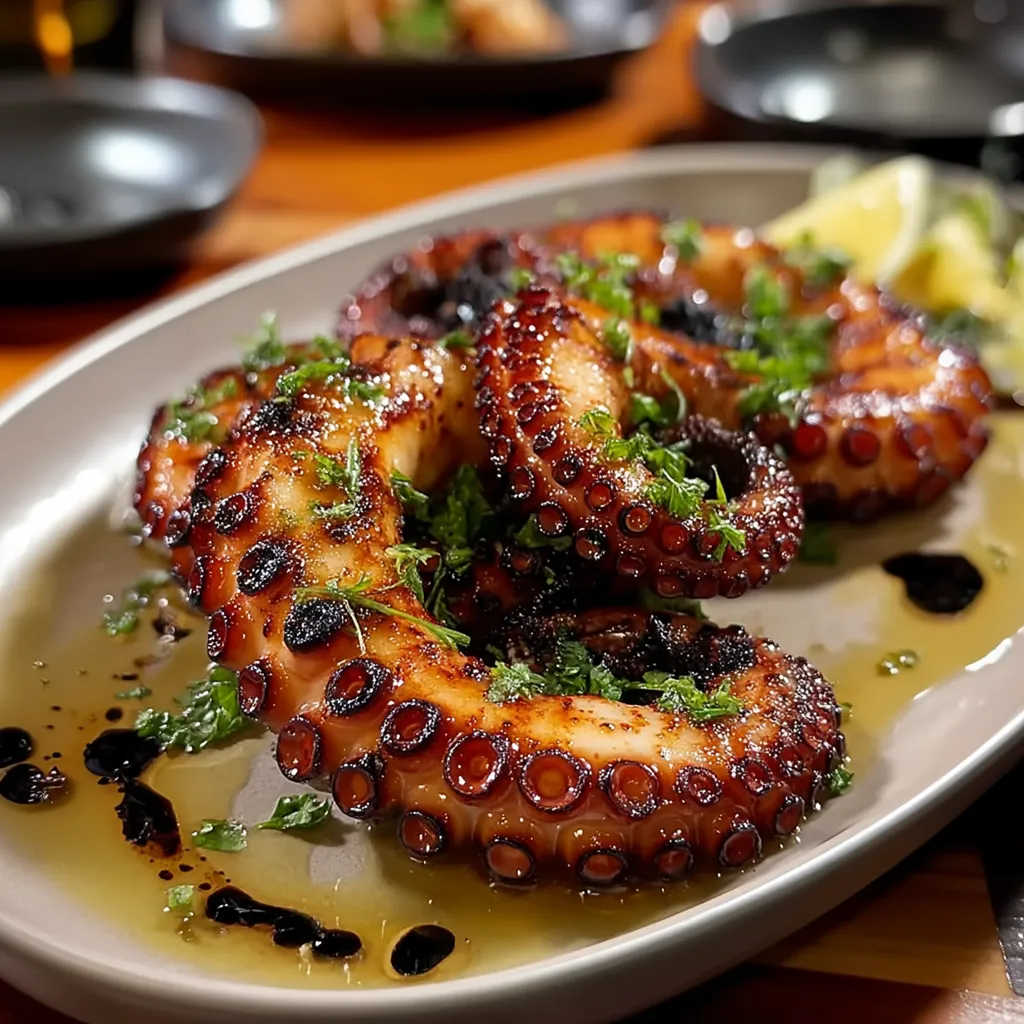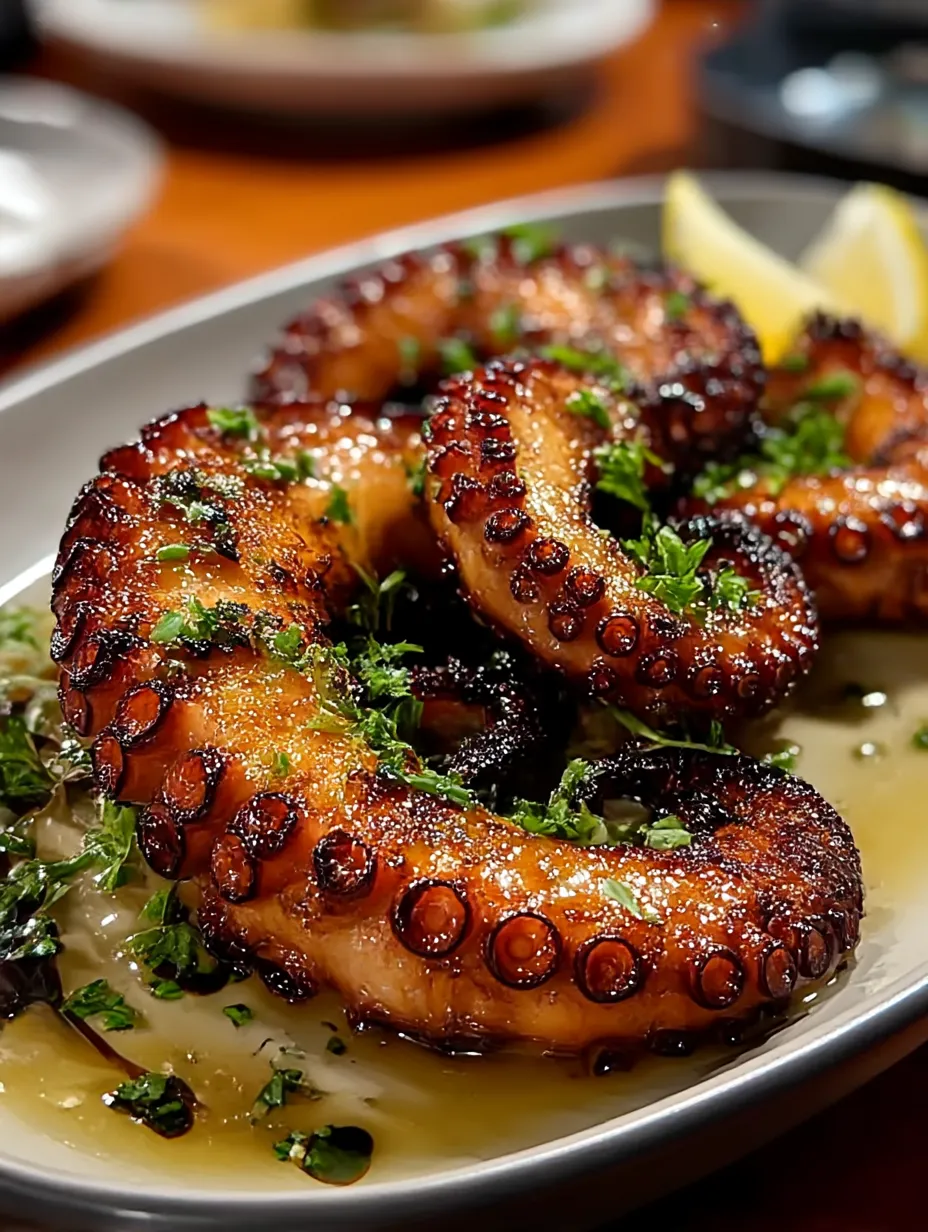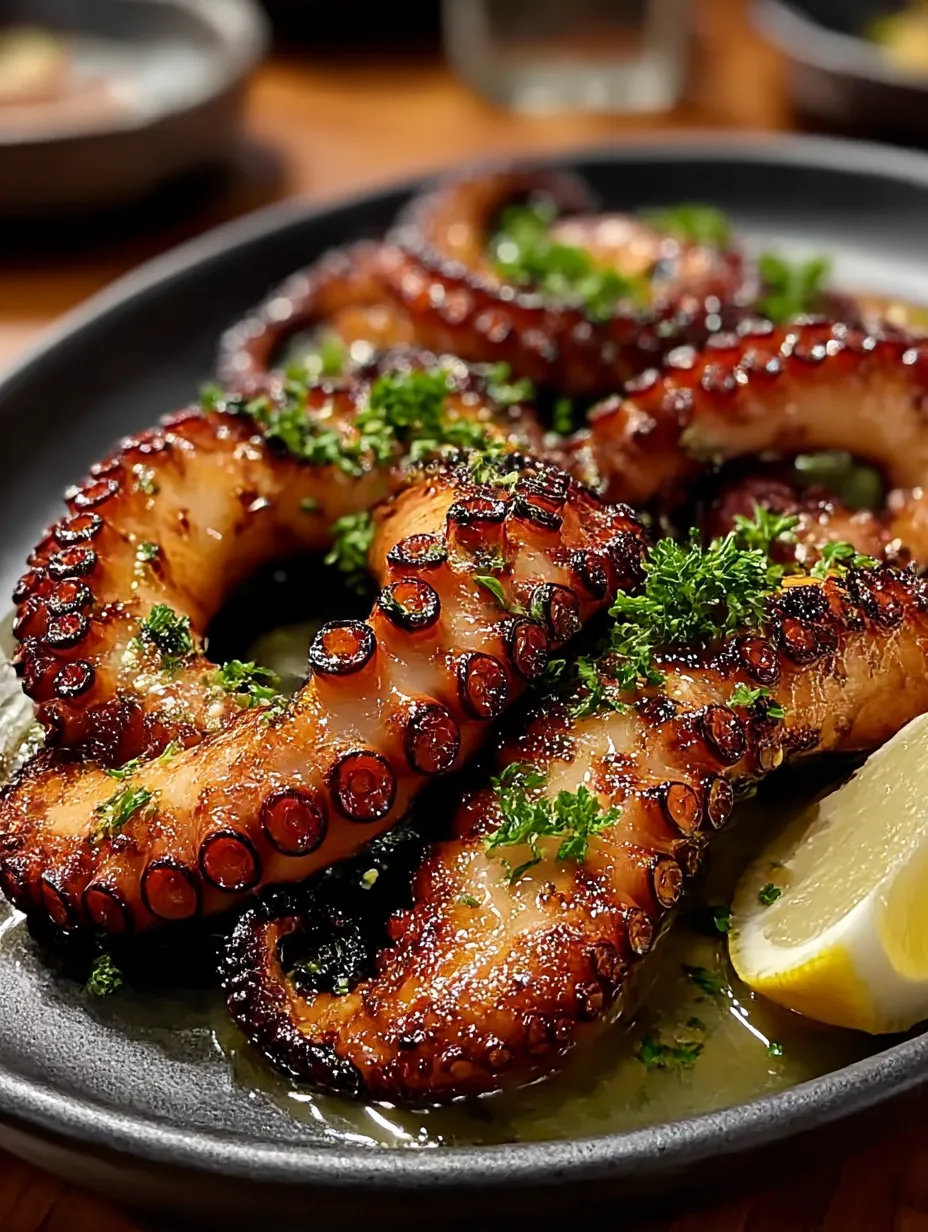 Pin it
Pin it
This juicy Mediterranean octopus from the grill turns an otherwise daunting seafood into a soft, tasty meal that'll make you feel like you're dining at a beachfront eatery. Great for wowing your friends or taking your cooking game up a notch on weekends, this approach makes working with octopus at home way less scary.
I picked up this trick at a cooking workshop in Greece where the instructor shared his grandma's secret for tender octopus. It's now my go-to dish whenever we have friends over for backyard summer parties.
What You'll Need
- Octopus, fresh or frozen: Around 2-3 pounds for best taste and feel, with the smaller ones usually being softer
- Top-quality olive oil: The good stuff for real Mediterranean taste and better browning
- Whole lemons: You'll need them for soaking and finishing touches to add brightness
- Fresh garlic: Crushed to let all those good flavors out while it soaks
- Oregano and thyme: These fresh herbs bring that classic Mediterranean magic
- Chunky sea salt: The rough kind works better with this hearty seafood
- Ground pepper: Crack it fresh for stronger flavor
- Chili flakes: If you want a bit of kick that goes nicely with octopus
Cooking Method
- Getting It Ready:
- Wash your octopus well under cold water, getting rid of any gunk in the body. If you're using frozen octopus, let it thaw in your fridge overnight. Check it over carefully and take out the beak from the middle of the tentacles if it's still there. Dry it off with paper towels before you start cooking.
- Making It Tender:
- Drop the whole octopus in a big pot of water (don't add salt) and slowly bring it to a boil. Some folks throw in a wine cork – it's an old trick from the Mediterranean that supposedly helps make the meat softer. Let it bubble gently for about 30-45 minutes, depending on size, poking it now and then with a fork until it feels soft. Keep the skin on while cooking to lock in all the juicy goodness.
- Adding Flavor:
- Take the octopus out of the water and let it cool completely. Cut it into tentacles and smaller pieces, then put them in a bowl with olive oil, chopped garlic, lemon juice, salt, and herbs. Mix everything gently so all pieces get coated and stick it in the fridge for at least 2 hours, though leaving it overnight will make it taste even better as the flavors soak in.
- Grilling It Right:
- Get your grill nice and hot, around 450°F. Take the octopus out of its marinade and shake off extra oil so it doesn't cause flames. Put the tentacles straight on the hot grill and cook them for 3-4 minutes on each side until they get those nice charred marks with crispy edges while staying soft inside from the boiling. That mix of crispy outside and soft inside is what makes grilled octopus so amazing.
- Making It Look Good:
- Move the grilled octopus to a plate and drizzle some more good olive oil on top. Squeeze fresh lemon over everything and sprinkle with sea salt, fresh pepper, and a little more herbs. Serve it while it's still warm for the best taste, so everyone can enjoy that perfect mix of tender meat and smoky flavor.
 Pin it
Pin it
The olive oil you pick really matters in this dish. I don't mind spending extra on a rich, peppery kind that turns the simple marinade into something amazing. My hubby always said he hated seafood until he tried this recipe during our anniversary dinner – now he can't get enough!
Finding Good Octopus
Getting the right octopus makes all the difference. Go for ones with tight, glossy skin that looks undamaged. Smaller octopus (2-3 pounds) usually turn out more tender than big ones. While fresh is great, frozen octopus often works better since freezing actually starts breaking down those tough fibers. Most fish counters sell them already cleaned, but if yours isn't, ask the person behind the counter to show you how or check out some videos online.
Keeping And Planning Ahead
You can make this grilled octopus up to two days early and keep it in the fridge. When you want to eat it, let it warm up on the counter then quickly heat it on the grill or in a pan just until it's warm so it stays tender. Leftover octopus tastes great in salads or grain bowls and will stay good for about three days in a sealed container. I usually make twice as much, serving half hot off the grill and saving the rest for a cold octopus salad the next day.
Classic Ways To Serve It
In Greece, they usually have grilled octopus as a starter alongside other small bites. You can create your own Mediterranean spread with yogurt dip, chickpea dip, feta, olives, and warm flatbread. As a main dish, pair it with a basic Greek salad and lemony potatoes or seasoned rice. It goes really well with crisp, tangy white wines like Assyrtiko or Albariño that cut through the richness and bring out the mild flavor.
A Bit Of Background
People around the Mediterranean and parts of Asia have been eating octopus for thousands of years. The ancient Greeks relied on it for protein, and you can see octopus in artwork from the Minoan times. Different coastal areas had their own ways of making it tender – some would slam it against rocks or hit it with wooden hammers. Our boiling method today gives you the same soft texture without all that drama.
 Pin it
Pin it
Frequently Asked Questions
- → What's the best way to soften octopus before grilling?
Simmer the octopus in salty water for about half an hour, or until it's fork-tender, to make sure it's easy to enjoy.
- → Which marinade brings out the best flavors in grilled octopus?
Mix olive oil, fresh garlic, lemon juice, and a pinch of salt and pepper for a simple, tasty marinade that keeps the octopus juicy.
- → How long should I grill octopus to get the best results?
Place it over high heat for 3–4 minutes on each side to get a nice crispy outside without losing the soft inside.
- → Do I need to rinse the octopus before cooking?
Absolutely. Wash the octopus under cold water to get rid of any ink or sand, so it's ready to cook.
- → How can I stop the octopus from turning rubbery?
Don’t overcook it. Tenderize by boiling first, and then grill quickly over high heat to keep its perfect texture.
